- Home
- Barbara Metzger
Love, Louisa Page 3
Love, Louisa Read online
Page 3
At night, she’d be looking at…nothing. There was not a single light through any of the front windows, even the ones with no blocking foliage. Nothing. Lions and tigers and—no, she would not let her imagination run amok. This was the country. But what if something happened to her, if an axe murderer, say, should creep out of the woods? No one would hear her screams. No one would even know if she lay dead on her dusty rug, not ’til the catalogs started to pile up in her shiny new black mailbox. How long before the mail got forwarded? Who was going to write to her anyway?
Axe murderers, she reassured herself even as she lit every lamp in the house, were, thankfully, few and far between. Knocking over mailboxes was about the extent of the crime rate, according to the local weekly newspaper. That and a couple of drunken drivers. This was not a high-crime area, even in this day and age. Why, Louisa’d bet half the Harborites still left their doors unlocked. Hers, of course, were locked and bolted. No matter how confident she tried to be, Louisa couldn’t sleep. Now the lights were in her eyes, the house was too quiet, her bed was too empty. No, she wouldn’t think about Howard or any other mean, ugly marauder. Instead, she’d keep her mind busy with all the things she had to do tomorrow, after the man came to clean the chimney and put a screen guard across the top. She’d find out how to sign up for cable so she could watch old movies all night, get a library card and take out an armload of books the way she did when she was eleven. She’d buy new garden shears, and gloves this time, and she’d get chains for the doors. No, she’d get a dog.
Howard hated dogs. Too much responsibility, he’d said, too much dirt and drool. He didn’t want dog hairs on his upholstery and he wouldn’t let one in his car, if it could have fit in that four inches behind the front seat. Cats got on the counters and birds made too much noise. All Louisa had was a pair of goldfish, still with her sister, if Annie’d remembered to feed them, and her kids hadn’t eaten them.
But a dog, all her own. Louisa smiled at the thought, and thought she hadn’t smiled since before the would-be wedding. Yes, a dog was just what she needed. In the face of such trauma, such personal upheaval as the loss of one’s sense of self, sense of direction, sense that she ever had any sense whatsoever, some women went shopping. Others went to the medicine cabinet or the local bar. Or on food binges. Louisa went to the pound, eating a chocolate bar along the way. The chimney guy’d been so late, she barely had time for her other errands.
There was an arrow across the street from the hardware store that pointed toward the animal shelter, room in her front seat, and no Howard telling her no. Definitely a sign from God.
“You’re not wanting a pet for the summer, are you?” the stocky, raspy-voiced woman in a tan uniform at the shelter asked after introducing herself as Jeanette, the adoptions counselor. Also the animal control officer, kennel manager, and cage cleaner. “We get crowds in here every spring,” she went on as she led Louisa through the empty building to the outdoor pens, “wanting a dog or a cat to keep the kiddies company at the beach house. Then they dump them on our doorstep when the kids go back to school. Or they just leave ’em on the streets. That’s why we make you sign a contract, pay for the license, and swear to get the animal spayed or neutered. Some other places, they make you have a fenced-in yard, and they go inspect your house to make sure you don’t live on a bad corner, or run a dog-fight ring in your cellar or something.” She shrugged. “You look decent, and I figure our dogs need homes too bad to be too fussy. ’Sides, I know where you live.”
Louisa felt as if she were making the wedding vows she hadn’t had the chance to speak. Do you, Louisa, take this abandoned mutt, ’til death do you part, in sickness and in health, to have and to hold on a leash…?
She did. She would. She’d think later about finding a Manhattan apartment that permitted dogs.
Well, if Louisa’d been looking for love to replace the louse, she’d come to the right spot. The dogs were throwing themselves against the bars of their cages, yipping their eagerness to go home to her run-down cottage, to stick their heads out the window of her old Toyota, to eat whatever kibble she could provide, even if it wasn’t a premium brand. Louisa was an angel to them, a goddess, a best friend.
Now all she had to do was pick one. She walked up and down outside the cages, reading the tags. Not a puppy; she didn’t know how to train one. Not an old dog; she couldn’t bear the thought of someone else leaving her. Not too big to fit in the car, not too small in case Annie’s kids came to visit, nothing that looked like it would get into fights, chase cars, or need a lot of grooming. Not the one who cowered in the back of its cage, or the one who almost climbed the chain links of the outdoor run. She would not ask what would happen to the dogs she did not choose.
Jeanette was looking at the clock in the kennel. “We close soon, you know.”
Louisa bet the woman took longer to choose from a dinner menu than she was giving her to select a lifetime companion. “I’m just not sure,” she said, over the din.
“Then come back tomorrow when you can take them out for a walk, see how they handle.”
Go back to that dark, empty house alone? Louisa walked toward the cage that held a big reddish hound with soulful eyes.
“Howls, that one does. Wants to be on the scent, too. Take your eyes off him a minute and he’ll follow his nose to the next county.”
Louisa didn’t want a dog that wasn’t going to be loyal. God knew she’d had enough of that. “What about this one?”
“The golden? She’s a handful.” Jeanette looked at Louisa in her size-five jeans. “You’re not up to her weight, unless you want to pay for a trainer.”
Louisa kept walking.
“Goldens shed bad, anyway.”
Louisa stopped in front of the pen of a slightly smaller, dark grayish dog with matted curly hair, and a short tail that was barely wagging, as if the dog were not willing to expend a lot of energy on yet another fruitless effort.
“He barks a lot, according to the woman who brought him in. That’s why she couldn’t keep him. Her apartment neighbors complained.”
“That’s what I want, a watchdog.”
Jeanette shrugged and started to unlatch the cage. “Sad story, this one. Lived with an old lady, he did. They say a nephew bought him for her, to ease his conscience, I guess, for leaving the woman alone. But she tripped over him, broke her hip, and landed in a convalescent home. The neighbor found the dog wandering in the street—that’s why he looks so ratty—but the old woman said she didn’t want him back, just to trip her up again. Then she died at the home, with no relatives coming at all. Sad way to go.”
Jeanette reached for a leash hanging next to the cage door. “The neighbor left messages with the nephew, the bastard. He never called back.” She shook her head while opening the cage door and hooking a leash to the dog’s collar. “Here. Take him around back. You’ll see he’s been trained. A real gentleman. Some kind of terrier, we think, Kerry blue or maybe giant schnauzer. Something like that. Never got his name, either.”
The dog put his bearded muzzle in Louisa’s hand, then took his place on her left side, looking up with big brown eyes, waiting for a command, waiting for a decision, waiting for yet another person to walk out on him.
“I know what it’s like to lose someone, too,” Louisa whispered, her choice already made. The dog was tall, dark, and handsome, so she called him Galahad. Every maiden in distress ought to have a knight in shining armor. Or matted fur.
Louisa didn’t sleep well that night either, despite the dog on an old blanket at the side of her bed. Galahad barked at every branch that scraped against the side of the house in that evening’s wind and rain storm, and every time the hot water heater kicked on. And he had fleas. Which meant that Louisa had fleas, because the dog didn’t stay on the floor for long.
Worst of all, for Louisa’s peace of mind, was that the dog, her guardian protector against things that went bump in the night, had to go o-u-t. On a leash. In the wind and the rain and the s
pooky, scary, pitch-black dark where things hid in the woods.
Lions and tigers and bears, oh, my.
Chapter Four
Fences were good.
Robert Frost liked them, the dog pound lady liked them, and Galahad would just have to get used to them in the backyard, when he got back from the vet where he was being bathed and neutered on the same day. Louisa felt bad for putting the sweetheart through another ordeal when he was hardly over the last, but the bugs and the balls had to go. Maybe he’d blame the adoption people instead of Louisa.
A fence was a good idea in other ways, besides eliminating midnight dog walks and keeping rabbits out of the garden she was planning. The barrier was symbolic, Louisa convinced herself as she struggled to get the rolls of chicken wire out of the car without shredding her shirt and her skin on the edges. She’d be marking her territory, like Galahad. This was her place, the mesh was going to tell the world, with her dog to defend it. She’d be safe inside, where no one could come along and steal her peace of mind again. Just a girl and her four-legged friend, against the world. No trespassing, not on her seedlings or her sore heart.
Granted, Louisa knew she was asking a lot of four-foot-tall chicken wire, but that was all she could afford. Besides, she could put it up herself, nailing it to the old split rail fence along the property line. A thief could cut it, a deer could jump it, rabbits could burrow under it, especially where Louisa hadn’t pulled the roll of wire tight enough, but she had her enclosure. She didn’t think Galahad would try to get out, for the dog had seemed content enough to stay by her side, not letting her out of his sight in the house. He suffered from insecurity, she supposed, and understood it well.
Louisa even figured out how to make a gate of sorts, with hook and eye latches from the hardware store. Hell, she was getting so good at hardware, maybe she’d get a job at Home Depot when her money ran out.
Which might be sooner than she supposed, after the vet bill. No one ever told her how expensive keeping a pet could be. Her goldfish cost what? Five dollars a year? Galahad’s bill was two pages long: surgery, anesthesia, bath, brush out, inoculations, blood tests, pills to prevent heartworm, and some stuff to put behind his neck to keep fleas and ticks away.
“Is this stuff safe?” she asked the white-smocked girl at the desk who was processing Louisa’s credit card into catatonia.
“Safer than Lyme disease and the allergies dogs get to flea saliva. Oh, and you better take some of this flea spray for the dog’s bedding, before they start breeding in your rugs.”
Louisa tried not to scratch at the bites on her legs and paid cash for the can of insecticide. “But you’re worth every penny of the cost,” she told the still-groggy dog on the ride home, patting his head that rested on her thigh. “And you’re even more handsome than I thought.” He smelled a lot better too, but she didn’t want to hurt his feelings, not after what he’d been through.
Did dogs know? she wondered. “Jeanette at the dog pound made me do it,” she told him, in case. It would be a hell of a note if her own dog, her own suddenly expensive-investment dog, didn’t like Louisa any better than her expensive ex-fiancé did.
Galahad licked her hand.
“Good doggy,” Louisa said, and sniffed back a tear. Someone loved her.
*
Louisa woke up the next morning feeling better rested than she had in weeks, both she and the dog having had a good night’s sleep. The dog had been drugged, and Louisa’d been exhausted from the unaccustomed physical labor. Besides, she had her fence, and the satisfaction of a job well-done. As soon as she had her shower, her breakfast and walked the dog, she’d start on the yard work.
Right after she renailed the section of fence that had come down.
With pad and pencil in hand, Louisa did a survey of her new kingdom. The outside of the house looked worse than it was, Louisa told herself. Once she cleared the vines and brambles off the windows and the weeds off the front walk, trimmed the bushes and gave the wood trim a scrape and a coat of paint, it wouldn’t look so much like a handyman’s special. Some flowers along the split rail fence, fresh curtains in the windows, a new coat of tar in the grass-cracked driveway, and the old place wouldn’t look like she felt, old and uncared-for. Those things she could do herself, and a bunch of the inside jobs. She had one of those how-to-fix everything books, didn’t she?
Louisa threw herself into the job, making lists, buying supplies and more home-repair books in equal numbers. She woke up early, worked ’til late, read ’til she fell asleep—and went whole hours without thinking of Horrid Howard.
When she took breaks, Louisa took Galahad on long walks, mostly on the beach. The bay was two blocks away, but the ocean was less than a ten-minute drive. She’d forgotten how exciting the ocean could be, how changeable the scenery near the shore. Every day, by different light, the water took on another color, a different texture. The horizon was so far, the waves so endless, Louisa couldn’t help being reminded of her own insignificance in the grand scheme of things. And if she was small in the universe, her misfortunes were positively petty. Besides, the dog was thrilled with the beach. How could anyone be miserable watching a silly mutt play tag with the waves or chase a sea gull or roll on a dead fish? Louisa kept looking over her shoulder in case Jeanette from the animal shelter caught her letting the dog off the leash to run loose.
Despite “Born Free” echoing off the dunes, Louisa was careful to clean up after the dog, remembering Manhattan rules and Manhattan mess when dog owners didn’t. Here, little by little, she learned to listen for the surf instead of sirens, and wake up to birdsong instead of the screech of tires. When she went back to the city, back to the real world, Louisa decided, she’d have to come out to the Harbor on weekends more, just to refresh herself in this slower pace, this newfound quiet. No makeup, no panty hose, no dry-clean-only suits—and no men.
The males she did get to know were the bald old guy at the hardware store who had been there before sponge brushes were invented, the cigar-chewer at the lumber yard, and the belly-over-the-belt plumber who came to fix the leaking pipes. They were enough. This was Louisa’s make-believe escapist fantasy. Who wanted trolls in Never-Never Land?
Louisa kept to herself in the little village, not ready yet to confront old friends or make new ones. Just a girl and her dog, sufficient unto themselves. She didn’t need anyone—except the stooped pharmacist at the one drugstore who showed her what poison ivy looked like, too late.
She did discover the joy of yard sales, though. She bought new pillows for the living room sofa, and a new lamp for her bedroom—for pocket change, it seemed. All the stuff in the world was out there, and she could afford it! She replaced the chipped juice glasses and the rickety stool and the ripped patio umbrella. She even bought a weed whacker that only needed a new cord, the people assured her, for two dollars. Heck, she could fix that easily. Bill at the hardware store had taught her how, after she ran over the electric lawn mower’s power line the third time. She could find almost anything she wanted at garage sales, stuff she desperately needed, and stuff she never knew she wanted ’til she saw it. Howard hated stuff. Clutter, thingies, knickknacks, junk, tchotchkes, he belittled anything he didn’t like or couldn’t see a use for. Louisa’d thrown out boxes of belongings when she’d moved into his apartment, never considering that she was tossing away bits and pieces of herself. Well, she was starting over with a blue pottery vase to put flowers in, a ficus tree taller than she was, and salt and pepper shakers in the shape of penguins, just because they made her smile. She doubted there was anything whatsoever in Howard’s entire apartment that cost under a dollar, and nothing that gave him as much pleasure.
Louisa also found new satisfaction in growing things. Pansies, geraniums, impatiens, all found spots around the house, along the fence, on the porch, climbing the mailbox post. The books she took out of the library said marigolds were easy to grow from seeds, and by god, they were. So were peas, sprouting an inch a day, it seemed. Lou
isa and Galahad made notes on their walks, studying other people’s yards and window boxes, then buying more seeds, more plants, another package of Miracle-Gro.
Slowly but…slowly, the house was getting ready to face the world, and so was Louisa. Well, at least she could now face the pudgy teenager at the gas station without worrying that no man was ever going to find her attractive again.
Louisa had her work—and her sore muscles to prove it—her dog, and her library books. (The chocolate was a given.) While she wouldn’t go quite so far as to say she was happy, she hardly shed a tear anymore, and was getting more satisfaction out of her roses and her re-bricked front path than she ever got out of conducting interviews and reading résumés. The only flies in her ointment—once the exterminator said the bugs in the kitchen were ants, not termites—were the neighbors.
The Mahoney house on Louisa’s left was still vacant, as was the one for sale, but the house on her right was rented. Louisa had no idea who held the lease, but she was pretty sure there were laws forbidding so many people congregating in one place every weekend. If there weren’t, there ought to be. Somewhat younger than Louisa, at least five couples appeared every Friday and partied with at least fifty others, it seemed, until Sunday. They played their music too loudly, parked their cars all over the street, and yelled at Galahad when he barked at the slamming doors and outdoor conversations. Worse, they sat on the fence that separated the two properties, breaking the top split rails and knocking down her chicken wire. They ran over her geraniums trying to fit so many vehicles in the driveway, and took a chunk out of the old oak tree at the sidewalk.

 My Lady Innkeeper
My Lady Innkeeper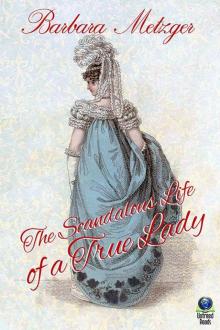 The Scandalous Life of a True Lady
The Scandalous Life of a True Lady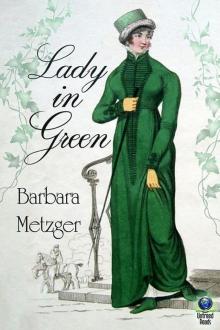 Lady in Green
Lady in Green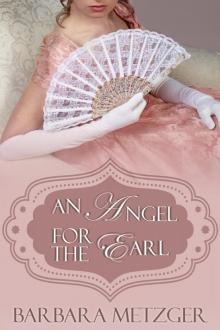 An Angel for the Earl
An Angel for the Earl Truly Yours
Truly Yours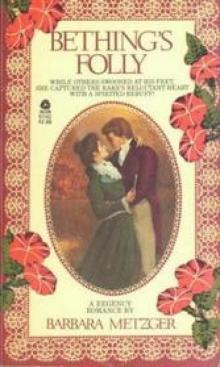 Bething's Folly
Bething's Folly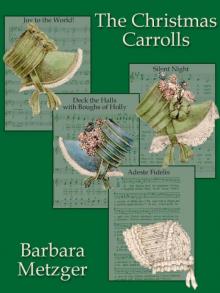 The Christmas Carrolls
The Christmas Carrolls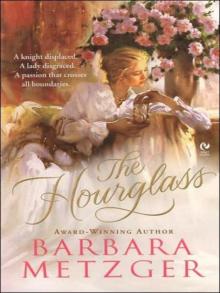 The Hourglass
The Hourglass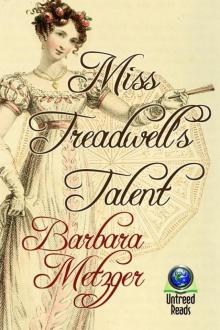 Miss Treadwell's Talent
Miss Treadwell's Talent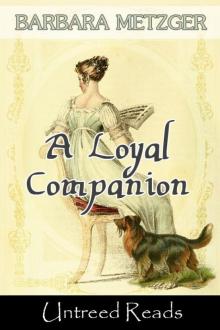 A Loyal Companion
A Loyal Companion Love, Louisa
Love, Louisa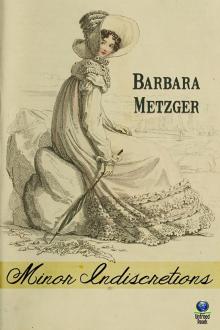 Minor Indiscretions
Minor Indiscretions Jack of Clubs
Jack of Clubs An Enchanted Christmas
An Enchanted Christmas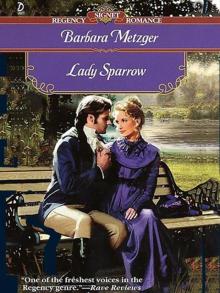 Lady Sparrow
Lady Sparrow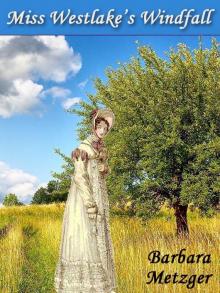 Miss Westlake's Windfall
Miss Westlake's Windfall Autumn Glory and Other Stories
Autumn Glory and Other Stories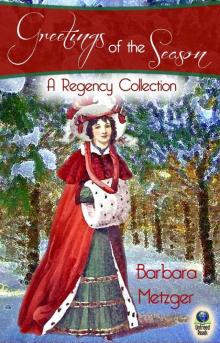 Greetings of the Season and Other Stories
Greetings of the Season and Other Stories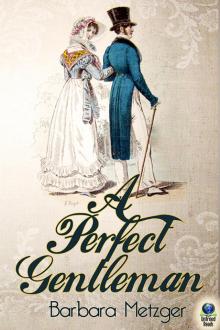 A Perfect Gentleman
A Perfect Gentleman